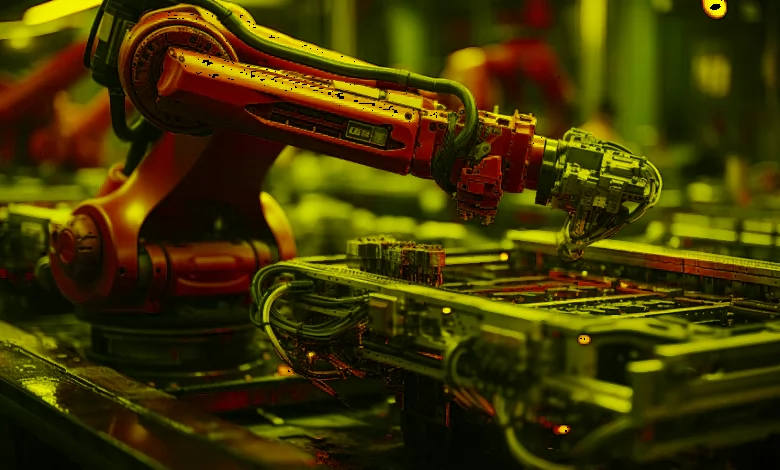The Top 100 Industries Shaping the World Economy

In the intricate tapestry of the global economy, various industries play pivotal roles, driving innovation, shaping consumer behavior, and influencing social and economic landscapes. From technology behemoths to traditional manufacturing giants, the world’s top 100 industries represent a diverse array of sectors that contribute significantly to global GDP and employment. Let’s delve into the realms of these influential industries and explore their impact on the world stage.
- Technology: At the forefront of innovation, the technology sector encompasses companies involved in software development, hardware manufacturing, telecommunications, and internet services. Giants like Apple, Microsoft, and Google lead the charge in shaping digital landscapes worldwide.
- Automotive: The automotive industry, characterized by manufacturers of cars, trucks, and components, is a cornerstone of the global economy. Companies like Toyota, Volkswagen, and General Motors drive transportation and mobility solutions across the globe.
- Financial Services: Banks, insurance companies, investment firms, and fintech startups collectively form the financial services industry, facilitating transactions, managing risks, and providing capital to businesses and individuals.
- Healthcare: With an aging population and increasing focus on wellness, the healthcare sector is booming. Pharmaceutical companies, medical device manufacturers, and healthcare providers work tirelessly to enhance medical treatments and improve patient outcomes.
- Energy: From traditional fossil fuels to renewable sources like solar and wind, the energy industry powers the world’s economies. Oil giants such as ExxonMobil and Chevron coexist with clean energy pioneers like Tesla and Vestas in a rapidly evolving landscape.
- Retail: Retailers, both online and brick-and-mortar, cater to consumer needs, offering a wide range of products and services. E-commerce giants like Amazon and Alibaba have transformed shopping habits, while traditional retailers adapt to changing market dynamics.
- Entertainment and Media: The entertainment industry, encompassing film, television, gaming, and digital media, captivates audiences worldwide. Streaming platforms like Netflix and Disney+ have revolutionized content consumption, while gaming companies like Tencent dominate the interactive entertainment space.
- Aerospace and Defense: Aerospace companies design and manufacture aircraft, spacecraft, and defense systems, playing crucial roles in national security and technological advancement. Boeing, Airbus, and Lockheed Martin are among the key players in this industry.
- Construction and Engineering: The construction sector builds the infrastructure that supports modern societies, including roads, bridges, buildings, and utilities. Engineering firms provide design and consultancy services, driving innovation in construction methods and materials.
- Telecommunications: Telecommunication companies facilitate communication and connectivity through networks, mobile devices, and internet services. AT&T, Verizon, and China Mobile are leaders in providing voice, data, and multimedia services to consumers and businesses.
- Food and Beverage: The food and beverage industry nourishes billions of people worldwide, encompassing agriculture, food processing, and distribution. Companies like Nestlé, PepsiCo, and Coca-Cola dominate markets with a wide array of products catering to diverse tastes and preferences.
- Logistics and Transportation: Efficient movement of goods and people is essential for global trade and connectivity. Logistics companies manage supply chains, while transportation firms operate ships, trucks, trains, and planes to deliver goods and passengers across continents.
- Chemicals: The chemical industry produces a vast array of substances essential for various applications, including pharmaceuticals, agriculture, and manufacturing. Companies like BASF, Dow, and DuPont are pioneers in developing innovative materials and chemicals.
- Mining and Metals: Extracting valuable resources from the earth, the mining and metals industry provides raw materials for manufacturing, construction, and energy production. Companies like BHP, Rio Tinto, and Vale operate mines worldwide, supplying essential commodities like iron, copper, and gold.
- Real Estate: The real estate sector encompasses residential, commercial, and industrial properties, driving construction and investment activities. Real estate developers, brokers, and investment trusts play critical roles in property development and management.
- Hospitality and Tourism: The hospitality industry caters to travelers’ needs, providing accommodation, dining, and leisure services. Hotels, restaurants, airlines, and tour operators contribute to the vibrant tourism sector, generating revenue and employment opportunities globally.
- Pharmaceuticals: Pharmaceutical companies research, develop, and manufacture medications to treat diseases and improve public health. Innovations in biotechnology and drug discovery drive advancements in medical science, offering hope for better treatments and cures.
- Education: The education industry encompasses schools, universities, online learning platforms, and educational technology companies. Providing knowledge and skills to students of all ages, the education sector fosters human capital development and lifelong learning.
- Consumer Goods: Consumer goods companies produce everyday products like toiletries, household items, and electronics for mass consumption. Brands like Procter & Gamble, Unilever, and Samsung cater to diverse consumer preferences, driving demand and brand loyalty.
- Renewable Energy: With growing concerns about climate change and sustainability, the renewable energy industry is gaining momentum. Solar, wind, hydroelectric, and geothermal energy companies contribute to reducing carbon emissions and promoting clean energy alternatives.
- Textiles and Apparel: The textiles and apparel industry manufactures clothing, textiles, and fashion accessories for global markets. Fast fashion retailers like Zara and H&M dominate the industry, while sustainable fashion brands promote ethical production practices.
- Advertising and Marketing: Advertising agencies, media companies, and digital marketing firms create campaigns to promote products and services to consumers. Brands invest in marketing strategies to build brand awareness, drive sales, and engage audiences across various platforms.
- Biotechnology: Biotechnology companies harness biological processes and organisms to develop innovative products and solutions in healthcare, agriculture, and environmental conservation. Advancements in gene editing, biopharmaceuticals, and biofuels hold promise for addressing pressing global challenges.
- Water and Wastewater Management: The water and wastewater management sector provides essential services for treating and distributing clean water and managing wastewater and sewage. Companies develop technologies and infrastructure to ensure access to safe drinking water and protect the environment.
- Insurance: Insurance companies offer financial protection against risks, including health, life, property, and liability. Insurers assess risks, underwrite policies, and provide claims settlement services, helping individuals and businesses mitigate potential losses.
- Packaging: The packaging industry designs and manufactures materials for protecting, containing, and transporting products. Sustainable packaging solutions, recyclable materials, and eco-friendly practices are gaining traction as companies strive to reduce environmental impact.
- Electronics Manufacturing: Electronics manufacturers produce a wide range of electronic devices, including smartphones, computers, and consumer electronics. Companies like Samsung, Apple, and Huawei drive innovation in electronics design, manufacturing, and supply chain management.
- Supply Chain Management: Supply chain management involves the coordination of activities to procure raw materials, manufacture products, and deliver goods to consumers. Companies optimize supply chains to reduce costs, improve efficiency, and enhance customer satisfaction.
- Waste Management and Recycling: Waste management companies collect, transport, and dispose of waste materials, while recycling firms process recyclable materials for reuse. Sustainable waste management practices and circular economy initiatives are essential for reducing landfill waste and conserving resources.
- Artificial Intelligence and Machine Learning: Artificial intelligence and machine learning technologies enable automation, data analysis, and decision-making in various industries. AI-driven innovations in robotics, healthcare, finance, and transportation are transforming business processes and driving productivity gains.
- Healthcare IT: Healthcare IT companies develop software and technology solutions to improve patient care, enhance clinical workflows, and streamline administrative processes. Electronic health records, telemedicine platforms, and health analytics systems support healthcare providers in delivering quality care.
- Green Building and Sustainable Architecture: Green building and sustainable architecture promote environmentally friendly design principles, energy efficiency, and resource conservation in building construction and urban development. Green building certifications and eco-friendly materials contribute to creating healthier and more sustainable built environments.
- Space Exploration and Commercialization: The space exploration industry encompasses government space agencies, private space companies, and commercial spaceflight ventures. Advances in space technology, satellite communications, and space tourism open up new frontiers for scientific research, exploration, and economic opportunities.
- Cybersecurity: Cybersecurity firms develop tools and solutions to protect digital assets, networks, and systems from cyber threats, including hackers, malware, and data breaches. With the proliferation of digital technologies, cybersecurity has become a critical concern for businesses, governments, and individuals.
- Smart Cities and Urban Planning: Smart cities leverage technology and data to improve urban infrastructure, transportation, energy efficiency, and public services. Urban planners and technology companies collaborate to create sustainable, resilient cities that enhance quality of life for residents and promote economic development.
- Precision Agriculture: Precision agriculture utilizes technology, data analytics, and automation to optimize farming practices, improve crop yields, and minimize environmental impact. Sensors, drones, and AI-driven analytics enable farmers to make data-driven decisions and manage resources more efficiently.
- E-commerce Logistics: E-commerce logistics companies specialize in warehousing, order fulfillment, and last-mile delivery services for online retailers. With the rise of e-commerce platforms like Amazon and Alibaba, efficient logistics operations are essential for meeting customer expectations and ensuring timely deliveries.
- Blockchain and Cryptocurrency: Blockchain technology enables secure, decentralized transactions and digital asset management through distributed ledgers. Cryptocurrencies like Bitcoin and Ethereum offer alternative forms of digital currency and financial transactions, disrupting traditional banking and payment systems.
- 3D Printing/Additive Manufacturing: 3D printing technology allows for the fabrication of three-dimensional objects layer by layer using digital designs and materials. Additive manufacturing processes are used in various industries, including aerospace, healthcare, automotive, and consumer goods, for rapid prototyping, custom manufacturing, and production.
- Quantum Computing: Quantum computing harnesses quantum mechanics principles to perform complex calculations and solve problems beyond the capabilities of classical computers. Quantum computers hold potential for revolutionizing cryptography, drug discovery, materials science, and optimization problems in various industries.
- Clean Transportation: Clean transportation initiatives promote electric vehicles, hydrogen fuel cells, and alternative fuels to reduce greenhouse gas emissions and combat air pollution. Automotive manufacturers,
- Clean Transportation: Clean transportation initiatives promote electric vehicles, hydrogen fuel cells, and alternative fuels to reduce greenhouse gas emissions and combat air pollution. Automotive manufacturers, including Tesla, Nissan, and Toyota, lead the transition to electric and fuel-efficient vehicles, supported by government incentives and infrastructure investments.
- Smart Grid and Energy Storage: Smart grid technologies enable efficient management and distribution of electricity, integrating renewable energy sources and enhancing grid resilience. Energy storage solutions like batteries and pumped hydro storage play a crucial role in balancing supply and demand, supporting renewable energy integration and grid stability.
- Microfinance and Financial Inclusion: Microfinance institutions provide financial services to underserved populations, including small business owners, farmers, and low-income individuals. Microcredit, savings accounts, and insurance products empower marginalized communities, fostering economic development and financial inclusion.
- Virtual Reality and Augmented Reality: Virtual reality (VR) and augmented reality (AR) technologies create immersive digital experiences for entertainment, training, education, and industrial applications. VR headsets, AR glasses, and immersive content platforms revolutionize gaming, tourism, healthcare, and design industries.
- Digital Identity and Authentication: Digital identity solutions enable secure and seamless authentication of individuals and entities in digital transactions and interactions. Biometric authentication, digital signatures, and blockchain-based identity verification enhance cybersecurity and privacy protection in online activities.
- Regenerative Medicine: Regenerative medicine harnesses the body’s natural healing mechanisms to repair, replace, or regenerate damaged tissues and organs. Stem cell therapy, tissue engineering, and gene editing techniques hold promise for treating degenerative diseases and injuries, revolutionizing healthcare and personalized medicine.
- Circular Economy and Sustainable Practices: The circular economy model promotes resource efficiency, waste reduction, and product lifecycle optimization to minimize environmental impact and maximize economic value. Sustainable practices like recycling, upcycling, and product stewardship drive innovation in manufacturing, packaging, and waste management industries.
- Cognitive Computing and Natural Language Processing: Cognitive computing systems emulate human-like intelligence and reasoning capabilities to process and analyze vast amounts of data. Natural language processing (NLP) technologies enable machines to understand and communicate in human languages, powering virtual assistants, chatbots, and language translation services.
- Remote Work and Telecommuting Solutions: Remote work and telecommuting solutions facilitate flexible work arrangements, enabling employees to work from anywhere using digital communication and collaboration tools. Remote work platforms, virtual offices, and telecommuting policies support work-life balance, employee productivity, and business continuity.
- Precision Medicine and Personalized Healthcare: Precision medicine approaches tailor medical treatments and interventions to individual patients based on their genetic makeup, lifestyle, and health status. Genomic sequencing, biomarker testing, and data analytics enable personalized diagnosis, treatment, and prevention strategies in healthcare.
- Vertical Farming and Urban Agriculture: Vertical farming and urban agriculture practices utilize indoor farming techniques and hydroponic systems to grow crops in urban environments with limited space and resources. Sustainable agriculture technologies, including vertical farms, rooftop gardens, and aquaponic systems, promote food security and urban sustainability.
- Smart Manufacturing and Industry 4.0: Smart manufacturing technologies integrate automation, data analytics, and IoT devices to optimize production processes, improve efficiency, and reduce costs in manufacturing industries. Industry 4.0 initiatives digitize factories and supply chains, enabling predictive maintenance, real-time monitoring, and adaptive manufacturing capabilities.
- Space-Based Technologies and Satellite Services: Space-based technologies, including satellite communications, Earth observation, and navigation systems, support a wide range of applications in telecommunications, agriculture, disaster management, and environmental monitoring. Satellite services providers, such as SpaceX, OneWeb, and Planet Labs, expand access to connectivity and geospatial data worldwide.
- Internet of Things (IoT) and Connected Devices: The Internet of Things (IoT) ecosystem encompasses interconnected devices, sensors, and actuators that collect, exchange, and analyze data in real-time. IoT applications span smart homes, cities, healthcare, agriculture, and industrial automation, driving efficiency, sustainability, and innovation in various sectors.
- Fintech Innovations and Digital Banking: Fintech startups and digital banking platforms leverage technology to deliver innovative financial products and services, including mobile payments, peer-to-peer lending, robo-advisors, and blockchain-based transactions. Fintech innovations democratize access to finance, promote financial inclusion, and disrupt traditional banking models.
- Blockchain-based Supply Chain Management: Blockchain technology offers transparent, secure, and traceable supply chain management solutions, enabling end-to-end visibility and accountability in global supply chains. Blockchain platforms, such as IBM Food Trust and VeChain, enhance supply chain resilience, authenticity, and sustainability by tracking products from source to destination.
- Clean Water Technologies and Desalination: Clean water technologies and desalination processes provide sustainable solutions for freshwater production and water purification in regions facing water scarcity and contamination challenges. Advanced water treatment systems, membrane filtration, and desalination plants ensure access to safe drinking water for communities worldwide.
- Renewable Energy Storage Solutions: Renewable energy storage solutions, including battery storage systems, pumped hydro storage, and thermal energy storage, address intermittency challenges and enable grid integration of solar, wind, and other renewable energy sources. Energy storage technologies support grid stability, peak shaving, and renewable energy dispatchability, accelerating the transition to clean energy systems.
- Digital Asset Management and Tokenization: Digital asset management platforms and tokenization protocols facilitate the issuance, trading, and management of digital assets, including cryptocurrencies, security tokens, and non-fungible tokens (NFTs). Blockchain-based asset tokenization unlocks liquidity, fractional ownership, and new investment opportunities in real estate, art, collectibles, and digital assets.
- Telehealth and Remote Patient Monitoring: Telehealth platforms and remote patient monitoring technologies enable remote healthcare delivery, virtual consultations, and continuous monitoring of patients’ health metrics outside traditional clinical settings. Telemedicine services, wearable devices, and IoT health monitors support remote diagnosis, treatment, and chronic disease management, improving access to healthcare services and patient outcomes.
- Renewable Energy Investments and Green Finance: Renewable energy investments and green finance initiatives mobilize capital for sustainable infrastructure projects, renewable energy development, and climate mitigation efforts. Impact investors, green bonds, and sustainable investment funds drive capital flows towards environmentally friendly projects and businesses, supporting the transition to a low-carbon economy.
- Sustainable Fashion and Ethical Apparel: Sustainable fashion brands and ethical apparel companies prioritize environmentally friendly materials, fair labor practices, and supply chain transparency in garment production. Circular fashion initiatives, eco-friendly textiles, and ethical fashion certifications promote sustainable consumption and responsible fashion industry practices.
- Digital Transformation Consulting and IT Services: Digital transformation consulting firms and IT service providers assist businesses in adopting digital technologies, optimizing processes, and enhancing customer experiences. Cloud computing, cybersecurity, and digital marketing services enable organizations to navigate digital disruptions and capitalize on emerging opportunities in the digital economy.
- Remote Learning Platforms and Online Education: Remote learning platforms and online education providers deliver digital courses, virtual classrooms, and educational content to students of all ages and backgrounds. E-learning platforms, MOOCs (Massive Open Online Courses), and digital learning tools democratize access to quality education, lifelong learning, and skills development opportunities globally.
- Smart Mobility Solutions and Autonomous Vehicles: Smart mobility solutions and autonomous vehicle technologies revolutionize transportation systems, urban mobility, and logistics operations. Electric vehicles (EVs), ride-sharing platforms, and self-driving cars enhance mobility options, reduce congestion, and promote sustainable transportation alternatives in cities and communities worldwide.
- Healthtech Startups and Digital Health Solutions: Healthtech startups and digital health innovators develop cutting-edge technologies, wearable devices, and telemedicine platforms to improve healthcare delivery, patient outcomes, and population health management. Health AI (Artificial Intelligence), remote patient monitoring, and digital therapeutics empower patients, clinicians, and healthcare providers to embrace digital transformation in healthcare.
- Smart Grid Technologies and Grid Modernization: Smart grid technologies and grid modernization initiatives modernize energy infrastructure, enhance grid reliability, and integrate renewable energy resources into the electricity grid. Smart meters, grid analytics, and demand response programs optimize energy consumption, reduce grid losses, and enable decentralized energy generation and storage.
- Biodegradable Packaging Solutions and Sustainable Materials: Biodegradable packaging solutions and sustainable materials replace traditional plastics and single-use packaging with eco-friendly alternatives made from biodegradable, compostable, or recyclable materials. Bio-based plastics, plant-based packaging, and sustainable packaging innovations reduce plastic pollution and environmental impact in packaging supply chains.
- Green Building Materials and Energy-Efficient Construction: Green building materials and energy-efficient construction practices promote sustainable building design, energy conservation, and environmental stewardship in the construction industry. Low-carbon concrete, recycled building materials, and passive house design principles improve building performance, occupant comfort, and indoor air quality in green buildings.
- Remote Collaboration Tools and Virtual Workspaces: Remote collaboration tools and virtual workspaces facilitate remote work, virtual meetings, and digital collaboration among distributed teams and remote workers. Video conferencing platforms, project management software, and virtual whiteboards enable seamless communication, collaboration, and productivity in remote work environments.
- Renewable Energy Certificates and Carbon Offsets: Renewable energy certificates (RECs) and carbon offsets enable businesses and organizations to support renewable energy projects and offset carbon emissions through environmental credits and carbon finance mechanisms. Renewable energy procurement, carbon offsetting, and sustainability reporting initiatives drive corporate climate action and environmental responsibility.
- Blockchain-based Digital Identity and Self-Sovereign Identity: Blockchain-based digital identity solutions and self-sovereign identity (SSI) frameworks empower individuals to control their personal data, identity attributes, and digital credentials in decentralized identity ecosystems. Decentralized identity platforms, verifiable credentials, and identity wallets enhance privacy, security, and interoperability in digital identity systems.
- Decentralized Finance (DeFi) Platforms and Yield Farming: Decentralized finance (DeFi) platforms and yield farming protocols enable peer-to-peer lending, borrowing, and liquidity provision on blockchain networks through smart contracts and automated market-making algorithms. DeFi protocols, liquidity pools, and decentralized exchanges (DEXs) democratize access to financial services, yield opportunities, and asset liquidity in decentralized finance ecosystems.
- Circular Economy Business Models and Product Lifecycle Management: Circular economy business models and product lifecycle management (PLM) strategies promote resource efficiency, waste reduction, and product stewardship throughout the product lifecycle. Cradle-to-cradle design, product-as-a-service (PaaS), and remanufacturing initiatives optimize resource utilization, minimize waste generation, and maximize value recovery in circular economy supply chains.
- Climate Resilience Technologies and Adaptation Solutions: Climate resilience technologies and adaptation solutions help communities, businesses, and ecosystems adapt to climate change impacts, extreme weather events, and natural disasters. Climate risk assessment, resilient infrastructure, and ecosystem-based adaptation measures enhance resilience, preparedness, and sustainability in the face of climate uncertainty.
- ClimateTech and Clean Energy Startups: ClimateTech and clean energy startups develop innovative technologies, solutions, and business models to address climate change challenges and accelerate the transition to clean energy. Cleantech incubators, accelerator programs, and venture capital funds support climate-focused entrepreneurs in scaling up renewable energy projects, carbon reduction initiatives, and climate resilience innovations.
- Smart Agriculture and AgriTech Innovations: Smart agriculture and AgriTech innovations leverage digital technologies, IoT sensors, and data analytics to optimize farming practices, improve crop yields, and enhance agricultural sustainability. Precision farming, AI-driven crop monitoring, and drone-based agriculture enable data-driven decision-making, resource optimization, and climate-smart agriculture solutions in rural communities and food production systems.
- Circular Fashion Platforms and Clothing Rental Services: Circular fashion platforms and clothing rental services promote sustainable fashion consumption through clothing sharing, rental subscriptions, and second-hand marketplaces. Fashion resale platforms, clothing libraries, and rental fashion startups extend the lifecycle of clothing items, reduce fashion waste, and promote circular economy principles in the fashion industry.
- Smart Energy Management Systems and Demand Response Solutions: Smart energy management systems and demand response solutions optimize energy consumption, reduce peak demand, and enhance grid reliability through real-time monitoring and control of energy usage. Energy analytics, smart meters, and demand-side management programs enable energy efficiency improvements, cost savings, and grid stability in residential, commercial, and industrial sectors.
- Decentralized Autonomous Organizations (DAOs) and Web3 Platforms: Decentralized autonomous organizations (DAOs) and Web3 platforms enable decentralized governance, community-driven decision-making, and peer-to-peer collaboration on blockchain networks. DAO governance frameworks, decentralized applications (dApps), and blockchain protocols empower users to participate in decentralized finance, governance, and digital asset ecosystems.
- Community Solar Projects and Distributed Energy Resources: Community solar projects and distributed energy resources (DERs) democratize access to clean energy and empower local communities to participate in renewable energy generation and distribution. Solar cooperatives, microgrids, and peer-to-peer energy trading platforms enable community-owned renewable energy projects, energy sharing arrangements, and energy independence initiatives.
- Zero-Emission Transportation Initiatives and Electric Vehicle Infrastructure: Zero-emission transportation initiatives and electric vehicle (EV) infrastructure deployments accelerate the adoption of electric vehicles, reduce greenhouse gas emissions, and improve air quality in urban environments. EV charging networks, electric vehicle incentives, and zero-emission vehicle mandates promote EV adoption, support renewable energy integration, and advance sustainable transportation goals.
- Digital Health Platforms and Telemedicine Networks: Digital health platforms and telemedicine networks expand access to healthcare services, improve patient outcomes, and enhance healthcare delivery through remote consultations, virtual care, and digital health monitoring solutions. Telehealth apps, remote patient monitoring devices, and health informatics systems enable remote diagnosis, treatment, and preventive care in virtual healthcare settings.
- Green Bonds and Sustainable Investment Funds: Green bonds and sustainable investment funds channel capital towards environmentally friendly projects, renewable energy infrastructure, and climate-resilient initiatives through impact investing and ESG (Environmental, Social, and Governance) criteria. Green finance instruments, sustainability bonds, and responsible investment strategies integrate environmental and social considerations into investment decision-making, driving positive social and environmental impact.
- Decarbonization Strategies and Net-Zero Commitments: Decarbonization strategies and net-zero commitments aim to reduce carbon emissions, mitigate climate change impacts, and achieve carbon neutrality in alignment with international climate goals. Corporate decarbonization pledges, carbon pricing mechanisms, and emission reduction targets drive investments in renewable energy, energy efficiency, and low-carbon technologies to transition to a sustainable, low-carbon economy.
- Open-Source Software Communities and Collaboration Platforms: Open-source software communities and collaboration platforms foster innovation, knowledge sharing, and collective development of software projects through decentralized, community-driven approaches. Open-source licenses, developer communities, and code repositories enable collaborative software development, peer review, and contribution to open-source projects across diverse domains and industries.
- Digital Asset Marketplaces and NFT Platforms: Digital asset marketplaces and non-fungible token (NFT) platforms facilitate the creation, trading, and ownership of digital assets, collectibles, and digital art on blockchain networks. NFT marketplaces, decentralized art galleries, and digital asset exchanges empower creators, artists, and collectors to tokenize, sell, and monetize digital content, artworks, and intellectual property rights.
- Decentralized Autonomous Vehicles and Mobility-as-a-Service (MaaS) Platforms: Decentralized autonomous vehicles (DAVs) and mobility-as-a-service (MaaS) platforms revolutionize urban mobility, transportation networks, and shared mobility services through autonomous vehicles, ride-sharing, and mobility-on-demand solutions. Self-driving car fleets, decentralized ride-hailing networks, and smart mobility platforms optimize transportation efficiency, reduce congestion, and enhance urban mobility experiences for passengers and commuters.
- Impact Investing Networks and Social Enterprise Incubators: Impact investing networks and social enterprise incubators support mission-driven businesses, social entrepreneurs, and impact investors in addressing social and environmental challenges through innovative business models and sustainable solutions. Impact accelerators, social impact bonds, and community investment platforms mobilize capital for social impact initiatives, sustainable development projects, and inclusive economic growth.
- Renewable Energy Cooperatives and Community-Owned Energy Projects: Renewable energy cooperatives and community-owned energy projects empower local communities to invest in renewable energy infrastructure, share ownership of clean energy assets, and participate in sustainable energy production. Community solar gardens, wind cooperatives, and energy co-ops enable community-based financing, collective ownership, and shared benefits from renewable energy generation and distribution.
- Renewable Energy Microgrids and Off-Grid Solutions: Renewable energy microgrids and off-grid solutions provide electricity access to remote communities, rural areas, and underserved populations through decentralized renewable energy systems. Solar microgrids, mini-grids, and off-grid solar home systems enable energy access, economic development, and social empowerment in off-grid regions without access to centralized electricity grids.
- Green Hydrogen Production and Hydrogen Economy Initiatives: Green hydrogen production and hydrogen economy initiatives promote the use of renewable energy to produce hydrogen through electrolysis, enabling carbon-free energy storage, transportation, and industrial applications. Green hydrogen projects, hydrogen fuel cells, and hydrogen infrastructure investments support the transition to a hydrogen-based economy, decarbonize hard-to-abate sectors, and facilitate renewable energy integration.
- Sustainable Transportation Infrastructure and Urban Mobility Solutions: Sustainable transportation infrastructure and urban mobility solutions enhance accessibility, safety, and sustainability in cities and urban areas through integrated transport systems, active transportation modes, and green mobility initiatives. Bike-sharing programs, pedestrian-friendly infrastructure, and public transit investments promote sustainable urban mobility, reduce congestion, and improve air quality in urban environments.
- Circular Economy Supply Chains and Closed-Loop Systems: Circular economy supply chains and closed-loop systems promote resource efficiency, waste reduction, and materials recycling through circular design, product lifecycle management, and reverse logistics strategies. Closed-loop manufacturing, product take-back programs, and materials recovery initiatives close the loop on resource consumption, minimize waste generation, and maximize resource recovery in circular economy supply chains.
- Carbon Capture and Utilization (CCU) Technologies: Carbon capture and utilization (CCU) technologies capture carbon dioxide emissions from industrial processes and utilize them to produce valuable products, chemicals, and materials through carbon utilization and carbon recycling. CCU projects, carbon utilization platforms, and CO2 conversion technologies mitigate greenhouse gas emissions, reduce carbon footprint, and create economic value from carbon capture and utilization.
- Circular Packaging Solutions and Sustainable Materials Innovation: Circular packaging solutions and sustainable materials innovation promote eco-friendly packaging alternatives, recyclable materials, and compostable packaging designs to reduce plastic pollution and promote circular economy principles in the packaging industry. Biodegradable packaging, compostable plastics, and plant-based packaging materials offer sustainable alternatives to conventional single-use plastics and packaging materials.
- Smart Water Management Systems and IoT Sensors: Smart water management systems and IoT sensors optimize water distribution, consumption, and conservation through real-time monitoring, data analytics, and smart water metering technologies. Water IoT platforms, smart irrigation systems, and leak detection sensors enable efficient water management, reduce water waste, and ensure water resource sustainability in urban and rural areas.
- Regenerative Agriculture Practices and Soil Carbon Sequestration: Regenerative agriculture practices and soil carbon sequestration initiatives promote sustainable farming methods, soil health management, and carbon farming techniques to enhance agricultural productivity, biodiversity, and climate resilience. Cover cropping, no-till farming, and agroforestry practices improve soil fertility, sequester carbon in soils, and mitigate climate change impacts in agricultural landscapes.
- Circular Electronics Recycling and E-Waste Management: Circular electronics recycling and e-waste management solutions recover valuable materials, components, and rare earth metals from electronic waste (e-waste) through recycling, refurbishment, and responsible e-waste disposal practices. E-waste recycling facilities, electronic waste recycling programs, and extended producer responsibility (EPR) schemes promote circular economy principles, reduce electronic waste pollution, and conserve finite resources.
- Blockchain-based Voting Systems and Digital Democracy Platforms: Blockchain-based voting systems and digital democracy platforms enable secure, transparent, and tamper-proof voting processes, citizen engagement, and democratic governance through decentralized voting mechanisms and blockchain-based voting protocols. Blockchain voting apps, decentralized governance platforms, and digital identity systems enhance electoral integrity, promote democratic participation, and safeguard democratic principles in the digital age.
As we conclude our exploration of the top 100 industries shaping the world economy, we recognize the transformative potential of innovation, sustainability, and collective action in addressing global challenges and building a more resilient, inclusive, and sustainable future for all. From renewable energy and circular economy initiatives to digital transformation and decentralized governance, these industries exemplify the power of human creativity, collaboration, and technology in driving positive change and shaping the world for generations to come.



